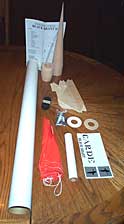Cosmodrome Rocketry Black Brant II
Cosmodrome Rocketry - Black Brant II {Kit}
Contributed by Todd Moore
| Manufacturer: | Cosmodrome Rocketry  |
Brief:
I bought a Black Brant II from Cosmodrome because I loved the Estes Brant kit when it was available, and I got tired of waiting for the Estes re-issue.... besides, the Cosmodrome kit is 50" tall... A bit cooler than it's counterpart.
 Construction:
Construction:
The rocket went together smoothly and quickly (3.5 Hrs) with 5min. epoxy used for the entire build. I replaced the steel shock cord that was included in the kit with aircraft cable of the same diameter after it was almost severed by crimping (with a hammer) the ferrule onto it. The instructions called for heavy sanding of the 3/16" plywood fins to a knife edge (about 75% of the fin area!). I deviated from this, and only sanded a 1/4" knife edge on the leading edge. (It's not to scale, but it was easy). The inclusion of motor retention is a much appreciated bonus.
 Finishing:
Finishing:
I decided to paint the rocket true to scale, so I put several coats of primer on, then several coats of gloss white, and then spent 3 hours masking the white areas off. The included detail sheet for painting was very helpful, but it's still took a while to mask such an intricate pattern. After 3 coats of black paint the rocket was unmasked. Simply stunning. The included decals were nicely done, and made the completed rocket very authentic looking.
After reading some comments about the balsa NC of the Brant not being heavy enough to reliably pull the chute out of the rocket, I decided to give it some extra pull by adding a 12" chute to the NC eyelet. This would also help in recovery, as the only other complaint I've read about this rocket it that the included chute is just a little too small.
 Flight:
Flight:
I selected a F52-5T for the maiden flight. wRASP simulation showed an 1170 ft. flight with maximum altitude at 6.1 seconds, and a maximum velocity of 314.6 ft/sec. True to the simulation, the rocket zoomed off the pad straight as an arrow to an estimated 800 or 900 ft., and deployed perfectly at max altitude.
Recovery:
The rocket drifted on for ever.... right into a rocket eating tree. The extra 12" chute was a little too much. The kit chute alone would have done just fine. (My friend scaled the tree and removed the rocket for me... if you're wondering).
Summary:
Overall, I'll give the Cosmodrome Black Brant II a 5 of 5 rating. The balsa NC is prone to damage (I knocked the pointy tip off (1/8") while transporting it), but that is the only negative comment I can think of. Super Kit!
 |
 |
Flights
 |
 |
L.N. (April 1, 2001)
J.B. (April 1, 2001)
J.M.E.S. (November 6, 2001)
N.O. (June 19, 2005)
J.R. (October 28, 2005)
 |
 |
C.S. (April 1, 2001)